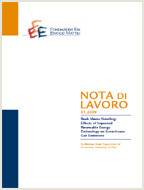Beyond Copenhagen: A Realistic Climate Policy in a Fragmented World

08.10.2010
Carlo Carraro, Emanuele Massetti
F5, Q01, Q54, Q58
Kyoto Protocol, International Climate Agreements, Climate Policy, Clean Development Mechanism
Climate Change and Sustainable Development
Carlo Carraro
We propose a realistic approach to climate policy based on the Copenhagen Agreement to reduce Greenhouse Gases (GHGs) emissions. We assess by how much the non-binding, although official, commitments to reduce emissions made in Copenhagen will affect the level of world GHGs emissions in 2020. Our estimates are based on official communications to the UNFCCC, on historic data and on the Business-as-Usual scenario of the WITCH model. We are not interested in estimating the gap between the expected level of emissions and what would be needed to achieve the 2°C target. Nor do we attempt to calculate the 2100 temperature level implied by the Copenhagen pledges. We believe these two exercises are subject to high uncertainty and would not improve the current state of negotiations. Rather, we take stock of the present politically achievable level of commitment and suggest an effective way to push forward the climate policy agenda. The focus is on what can be done rather than on what should be done. To this end, we estimate the potential of the financial provisions of the Copenhagen Agreement to sponsor mitigation effort in Non-Annex I countries. Using scenarios produced with the WITCH model, we show that lower commitment on domestic abatement measures can be compensated by devoting roughly 50% of the Copenhagen financial provisions in 2020 to mitigation in Non-Annex I countries. The policy implications of our results will be discussed.
***
Suggested citation: Carlo Carraro and Emanuele Massetti, Beyond Copenhagen: a realistic climate policy in a fragmented world, Climatic Change (2012) 110:523–542
http://dx.doi.org/10.1007/s10584-011-0125-6
